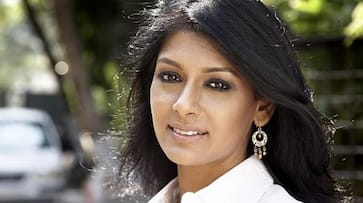Manto, directed by Nandita Das and starring Nawazuddin Siddiqui in the title role of Pakistani author, playwright and writer Saadat Hasan Manto with Rasika Duggal as his wife Safia and Tahir Raj Bhasin playing Manto’s friend, confidant, and inspiration, is based on the 1940s post-Independence period of India, and releases this week.
The life of Saadat Manto is perhaps one of the most fascinating stories in celluloid which hasn’t been told as yet and Nandita’s vision will bring it alive at this scale for the first time. Manto produced 22 collections of short stories, a novel, five series of radio plays, three collections of essays, two collections of personal sketches, and some of his best works are short stories including Thanda Ghost and Toba Tek Singh. He wrote truths that no one dared to talk about and was tried for obscenity six times but never convicted. In a candid chat with Nandita Das, we ask her why Manto is more relevant than ever, today.
What made you want to direct a film on a controversial character like Manto?
I'll be honest, it didn't come easy. It was a mammoth task and took me 5 years to even put the script together. But I knew for a fact that I wanted to put out the story of Manto for people to know the kind of person he was and be inspired by him the way I was ever since I heard his story. He's more relevant now more than ever and I believe it was the right time to make this film. Making Manto was my way of reacting to the current political situation here. Through the years, Manto continued writing in spite of being tried for it six times; he is the epitome of fearlessness and free-spiritedness. I knew I wanted the world to find inspiration in him the way I did.
Manto was accused of obscenity in his writing, and decades later, our creative liberties tell a similar story. Your views.
It's been several years and we are still struggling with freedom of expression. Although, I have to admit we're getting better in terms of the number of restrictions but we're not nearly anywhere close to being a liberal society for creative individuals like artists, writers, freethinkers who continue to be silenced.

When you read them, did you feel his writings were ‘obscene’ or ‘pornographic’?
Manto has written short stories, essays, radio plays and sketches over the years so it wasn't possible for me to complete a thorough research but yes, I have read a majority of his books — which is what gave me the brainchild of this film in the first place. I believe that every society has some norms and school of thought and whoever dares to think differently or speak honestly are condemned by these self proclaimed custodians. We see this happening around us even now, which is why I repeatedly emphasize on how relevant this film is today.
What was the largest influence of his life and works on you?
I think just the fact that he was a liberal man in the true sense -not just when it came to his writing, but even at home. He would iron his wife's sari, make pickle, feed his children, read out stories to them - he defied societal norms back in those days when men like him seldom existed. The more I learnt about him from his family, the more I was amazed by the kind of person he was.
Which part of you of Manto has stayed with you afterword?
The Mantoniyat (Manto-ness) will perpetually stay with me because of the impact he has had on me. I believe that the ability to be free spirited, unapologetically honest and courage to change societal norms exists within all of us, we just need to find our voices to make a difference.
Do you feel Manto should have stayed back in India?
I think if he stayed back in India for longer, he would've definitely made a bigger impact on people's lives. Making his writing accessible to the people would've probably inspired them to bring out their Mantoniyat and helped make a difference sooner.

Why did you choose Nawaz as Manto?
Casting Nawaz as Manto was half the battle won because of how alike they already were. He was always on my mind when I started writing Manto. Nawaz is a very versatile actor and he was an obvious choice for me. He is sensitive, intense, vulnerable and his sense of humour matches that of Manto's.
What prosthetics did you have to use for him to look like him?
We refrained from using any technological means and primarily stuck to the traditional methods of research - mostly his writing, trying to delve into his thought process and mannerisms.
Did Nawaz isolate himself for weeks in a space so he could relate to the character more?
Nawaz had cut himself off from all sorts of communication to get into the skin of his character. He would study everything from the way he held his pen to write to his body language. He had, of course, read a lot of his writing as well. He would dress like Manto even when he wasn't on the set. We got a lot of help from his daughters as well, that helped us delve deeper into who Manto was. Eventually, I could see Manto in his eyes.
How relevant is a film like Manto today?
It is more relevant than ever today. Our voices are still oppressed, we are still not taken seriously and seldom have the courage to speak up against societal norms. This film will definitely resonate with the youth and, hopefully, bring about a change.
According to you, what are the makings of a good modern day rebel?
A good modern day rebel would be someone who's unabashedly honest and not afraid to voice their opinion. They wouldn't challenge the system just to pick a fight or to make noise but actually intend to make a change for the better.
What research went behind the film?
For starters, I had gone through a lot of Manto's writing which further inspired me to take this further. I would explore the locations he was associated with, to find places that would still have that old world charm. Researching and settling on a location was the biggest challenge but we finally managed to find a place in Gujarat that could be routed as the Lahore in India. A huge chunk of my research involved spending time with Manto's family to make sure he's represented correctly.
What next?
I'm getting quite a few offers for acting and directing but I want to solely focus on Manto till the promotions and the film festivals are done with. I'm also considering publishing a book on the making of Manto because of the experience that it's been.
Last Updated Sep 19, 2018, 9:28 AM IST









![Salman Khan sets stage on fire for Anant Ambani, Radhika Merchant pre-wedding festivities [WATCH] ATG](https://static-gi.asianetnews.com/images/01hr1hh8y86gvb4kbqgnyhc0w0/whatsapp-image-2024-03-03-at-12-24-37-pm_100x60xt.jpg)
![Pregnant Deepika Padukone dances with Ranveer Singh at Anant Ambani, Radhika Merchant pre-wedding bash [WATCH] ATG](https://static-gi.asianetnews.com/images/01hr1ffyd3nzqzgm6ba0k87vr8/whatsapp-image-2024-03-03-at-11-45-35-am_100x60xt.jpg)


